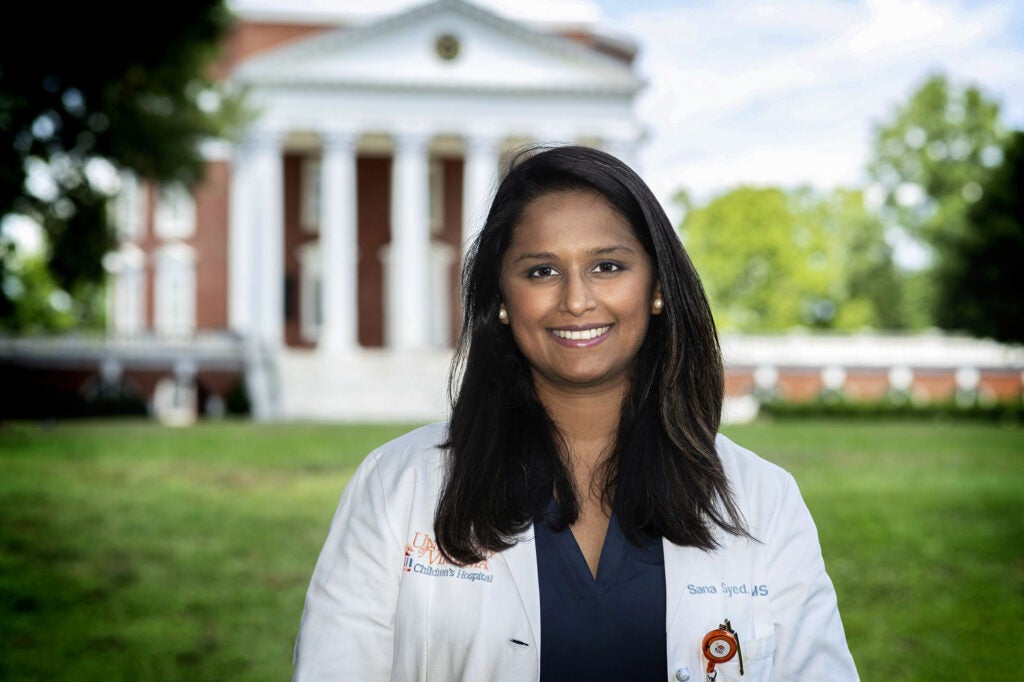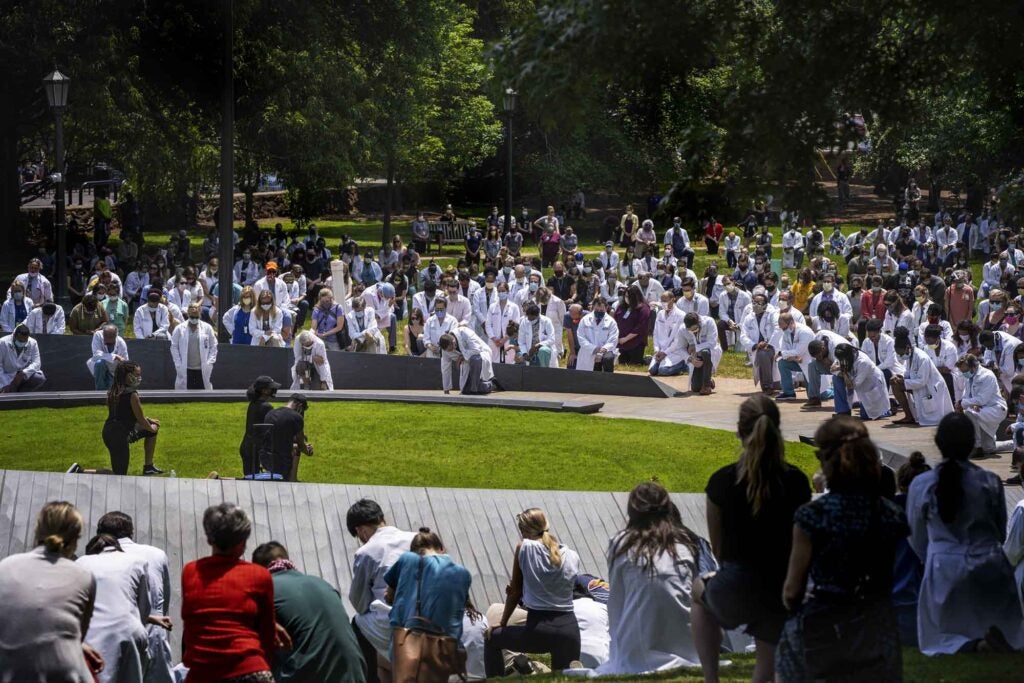
Dr. Sana Syed is a doctor and scientist with a background in pediatrics, gastroenterology, global health and data science. (Photo by Dan Addison, University Communications)
Last month, many University of Virginia health care providers donned white coats and took a knee at UVA’s new Memorial to Enslaved Laborers, protesting racism and inequality and showing support for a national “White Coats for Black Lives” movement and the Black Lives Matter movement.
Among them was Dr. Sana Syed, a pediatric gastroenterologist who joined UVA Health three years ago. She and other attendees began talking about immediate action they could take to fight inequality in their communities, and to promote diversity in their professions and schools.
One idea that kept coming up was supporting STEM teaching in Charlottesville elementary schools to bridge educational gaps.

A crowd gathered June 5 at UVA’s Memorial to Enslaved Laborers to protest George Floyd’s death at the hands of Minneapolis police and raise awareness of broader issues of racism and inequality. (Photo by Sanjay Suchak, University Communications)
“Historically, people of color are underrepresented in STEM professions because there are many systemic barriers to entering these fields,” said Syed, whose young son is about to start kindergarten this fall in the Charlottesville City Schools. Those obstacles, she noted, can begin as early as elementary school.
“If a child does not have the supplies to do a volcano experiment, for example, he might never get interested in chemistry, or she might not realize that adults who look like her can do those jobs,” she said.
As a first step, Syed and colleagues are now working with the Charlottesville City Schools iSTEM program, led by Dr. Nigel Standish, to create and distribute in-home STEM teaching kits to help children missing access to regular classroom supplies during the pandemic. The kits, which Syed and her colleagues are raising money for now, will include supplies needed for STEM lessons and experiments, like measuring tape, scissors, thermometers, scales, tape and measuring cups, in quantities to last through the school year. They will help ensure that all students, regardless of their family’s economic situation, have access to materials needed to continue their STEM education at home.
The project’s $30,000 fundraising goal would supply kits for 1,500 to 2,100 children enrolled in kindergarten through fourth grade at Charlottesville’s six elementary schools.
“There are a lot of global conversations happening right now, about the Black Lives Matter movement and also inequity in our schools,” Syed said, “and while it is amazing that we are having those discussions and creating this awareness, we also need action now, in this very moment. And we can take action in our local communities.
“Our broad approach was to talk with the schools about what they were doing and what resources they needed. We did not want to impose our own ideas or suggestions. Dr Standish and his STEM team of seven elementary school teachers had already done an incredible amount of planning and thoughtful deliberation about how to equitably serve the needs of children starting school this fall. The home STEM boxes idea was their brainchild. I am so happy we could help raise funds to support their initiative!”
The kits will complement Charlottesville’s iSTEM program, which includes engineering and technology programs in elementary schools and in Buford Middle School and Charlottesville High School, where students often collaborate with UVA Engineering students for hands-on projects.
Standish said students going to iSTEM labs in their schools have many tools and materials available. But when schools closed to in-person instruction in March, it became apparent that those same materials weren’t available in every home.
“The iSTEM teachers worked hard to develop projects and challenges that could be completed with only a core set of tools and materials. With the amazing support of Dr. Syed from UVA’s School of Medicine, we aim to give each student a STEM box so their teachers can be sure every student has an equal opportunity to participate and learn from the STEM challenges,” Standish said. “We are very grateful to have community partners like Dr. Syed and look forward to exploring other collaborations where we can continue to support our children’s learning.”
For Syed, the project has hit close to home. She grew up in England and Pakistan, and having lived and worked in Durham, North Carolina; Atlanta and Boston, she had grown used to the diversity of these cities. She wants her son to experience similar diversity of race and thought in Charlottesville, and to feel that he and his classmates have an equal shot at a great education, no matter their background or home life.
“As a pediatrician, what inspires me every day is making sure every child has a healthy, happy life,” she said. “The inequity we still see today shocks me, and there are so many needs that children in this community have. … If we can get men on the moon, then we can fix many of these problems. It’s all about our goals as a community and large society and how we use our resources to take action.”
So far, she said, response among her UVA colleagues and the wider community has been enthusiastic. More than 100 donors have contributed funds, raising more than $10,000 in just a few days, which means they can cover supplies already for two schools. An additional $20,000 would allow them to serve all the six Charlottesville elementary schools.
Other colleagues, like Dr. Michael Williams in the Department of Surgery, are working to bring together faculty and colleagues to promote diversity within UVA Health. A pair of doctors, Dr. Ebony Jade Hilton and Dr. Leigh Ann Webb, have even written a children’s book, called “We’re Going to Be O.K.,” designed to help children of color face a pandemic that is disproportionately affecting their communities.
“I am so appreciative of the response we have gotten so far,” Syed said. “It has really reaffirmed my faith in humanity and that people care about making a difference.”
Learn more about the project and contribute here.
Filed Under: Clinical, Featured, Media Highlights, Research
